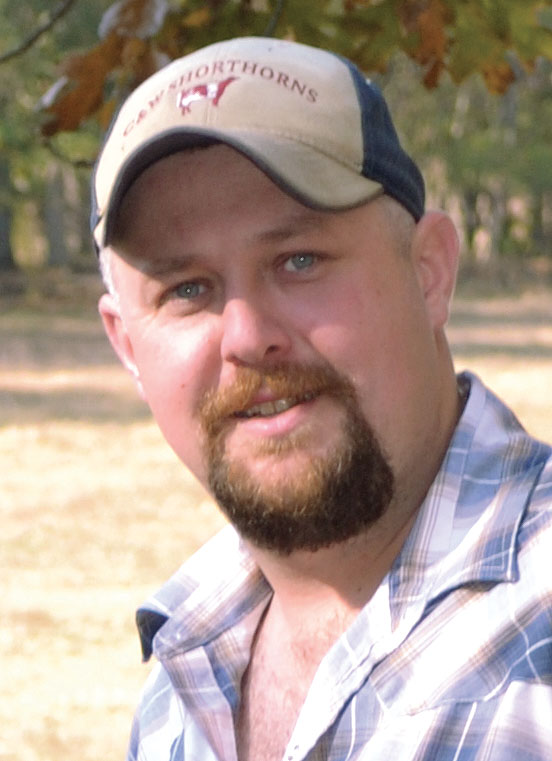 In 1999, Wendy Dickens, now Childers, attended a cattle sale that included an essay contest on the attributes of Shorthorn cattle.
In 1999, Wendy Dickens, now Childers, attended a cattle sale that included an essay contest on the attributes of Shorthorn cattle.
She entered and won, never imagining the life long journey it might entail. That day, her prize was a free show heifer, a Shorthorn. Today, she and her husband, Chris raise 30 head of registered and 25 head of commercial Shorthorn crossbreds on 200 acres of Wendy’s parents’, Richard and Jo Dickens, original farm. Eighty of those acres compromise what will soon be a Century Farm for her family.
“I never grew up,” Wendy laughed. “I still live where I grew up.”
Wendy grew up showing Shorthorns, but Chris was a stranger to the show ring until a few years ago.
“We have been showing registered Shorthorns for four years now,” Chris said. “When we showed at Ozark Empire Fair, it was my first time to show. I just kept thinking, I’ve never done this before and (Wendy) just went to work because, of course, she knew just what to do. And we won the Reserve Division. Since then we’ve shown all over, Forth Worth (Texas), Amarillo (Texas), Nashville (Tenn.), Jackson, Miss., and the American Royal in Kansas City.”
Chris continued to explain he and Wendy’s cattle operation, recently while seated at the table in their cozy kitchen in rural eastern Laclede County.
Chris, who works as a dispatcher for a Springfield trucking company and Wendy, a Post Office rural carrier, met in 2006 and married in 2010. They both find working fulltime as well as raising cattle on the side, make their days more than full but they also greatly enjoy what they do.
“This is black cow country and there’s concern about the color of these cattle from a few people but our buyers quickly find the meat to be good,” Chris said. “The bull market has come along and I’ve sold steers and bulls and the consignment sales on our heifers have done well, too.”
Chris also attended A.I. school. Their first A.I. calves hit the ground in 2011. He ended up trading those crossbreds to his father-in-law for a few of his registered Shorthorns, one more way to improve his herd.
“We breed to registered Shorthorn bulls, with traits for the commercial cattle man in mind,” Chris explained.
They have also dabbled with embryo transfers.
The couple has stuck with Shorthorns over the years because of they like the characteristics the breed has to offer.
“Shorthorns are really maternally-oriented. We try to keep the good milkers,” Chris went on to say. “We don’t like to pull calves so we look for calving-ease in our cows. We’ve found the genetics of Canadian bulls to be good in this area.”
He added that they have also found places to individually market their cattle, including where Chris works.
Overall, the couple plans to continue to improve and their herd, and pastures, through better management.
“I’ve been to intensive grazing school and we are working on incorporating that, too. It all just takes time. We calve year round, depending on where we market,” Chris said. “We just started with the Missouri Shorthorn Association, but we’ve been with the Ozarks Shorthorn Association for two years and they’ve helped to put together a spring sale.”
While both Chris and Wendy admit that Shorthorns are not as well known here as other breeds in this region, Wendy remains strongly behind her long-time favorites.
“Their calves hit the ground small and grow fast,” she said. “They are good mommas, good milkers and very docile. When it comes to the kind of cattle you raise, you have to follow your heart. Don’t let the big market or big producers discourage you. The stockyards are not going to dictate what I raise. If you are going to have cows, you might as well have something you love.”







